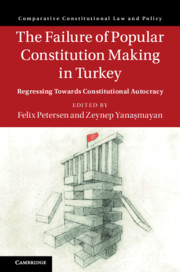Book contents
- The Failure of Popular Constitution Making in Turkey
- Comparative Constitutional Law and Policy
- The Failure of Popular Constitution Making in Turkey
- Copyright page
- Contents
- Figures
- Contributors
- Part I Introduction
- Part II Contextualizing Constitution Making in Turkey
- Part III Debating and Drafting the Constitution in 2011–2013
- 5 Debating State Organization Principles in the Constitutional Conciliation Commission
- 6 Glass Half Full: Drafting Fundamental Rights in the Turkish Constitution-Making Process (2011–2013)
- 7 Countermajoritarian Institutions in Turkish Constitution Making
- 8 Debating the Amendment-Making Rule: The Rigidity vs. Flexibility Debate in the Turkish Constitution-Making Process
- Appendices
- Index
6 - Glass Half Full: Drafting Fundamental Rights in the Turkish Constitution-Making Process (2011–2013)
from Part III - Debating and Drafting the Constitution in 2011–2013
Published online by Cambridge University Press: 19 December 2019
- The Failure of Popular Constitution Making in Turkey
- Comparative Constitutional Law and Policy
- The Failure of Popular Constitution Making in Turkey
- Copyright page
- Contents
- Figures
- Contributors
- Part I Introduction
- Part II Contextualizing Constitution Making in Turkey
- Part III Debating and Drafting the Constitution in 2011–2013
- 5 Debating State Organization Principles in the Constitutional Conciliation Commission
- 6 Glass Half Full: Drafting Fundamental Rights in the Turkish Constitution-Making Process (2011–2013)
- 7 Countermajoritarian Institutions in Turkish Constitution Making
- 8 Debating the Amendment-Making Rule: The Rigidity vs. Flexibility Debate in the Turkish Constitution-Making Process
- Appendices
- Index
Summary
Fundamental rights and freedoms constitute the majority of agreed articles in the draft constitution produced by the Constitutional Conciliation Commission ‘Anayasa Uzlaşma Komisyonu, AUK’. This chapter analyzes the content of these articles and seeks to explain why the AUK was able to achieve more consensus on these than on other provisions ‘e.g., principles of state organization’. It argues that constitutional borrowing, both horizontal and vertical, served as an inspiration and consensus-achiever in the discussions. The agreed draft text contains provisions that are either constitutional novelties or offer more far-reaching protection than the existing constitutional framework. We particularly emphasize the normative authority the European Convention on Human Rights enjoyed in the deliberations and the role of human dignity as a foundational constitutional norm “borrowed” primarily from the German Basic Law. The chapter concludes that the draft chapter on fundamental rights and freedoms was neither an unequivocal success story nor a complete failure. Nevertheless, the constitution-making process remains a missed opportunity for democracy in Turkey.
Keywords
- Type
- Chapter
- Information
- The Failure of Popular Constitution Making in TurkeyRegressing Towards Constitutional Autocracy, pp. 183 - 217Publisher: Cambridge University PressPrint publication year: 2020



